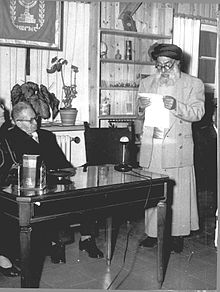| |
|---|---|
 Rabbi Moshe Gabai, head of the Jewish community of Zakho, with Israeli President Yitzhak Ben-Zvi in 1951 | |
| Total population | |
| 250,000-300,000[1] | |
| Regions with significant populations | |
| c. 200,000[2][3][4][5] | |
| Languages | |
| Israeli Hebrew, Northeastern Neo-Aramaic dialects (mainly Judeo-Aramaic), Kurdish dialects (mainly Kurmanji), Azeri Turkish (in Iran)[6] Additional: Mizrahi Hebrew (liturgical use) | |
| Religion | |
| Related ethnic groups | |
| Other Mizrahi Jews, in particular Iraqi Jews, Iranian Jews, Assyrian Jews, Bukharian Jews and Syrian Jews | |
| Part of a series on |
| Jews and Judaism |
|---|
 |
The Jews of Kurdistan[a] are the Mizrahi Jewish communities from the geographic region of Kurdistan, roughly covering parts of northwestern Iran, northern Iraq, northeastern Syria and southeastern Turkey. Kurdish Jews lived as closed ethnic communities until they were expelled from Arab and Muslim states from the 1940s–1950s onward. The community largely spoke Judeo-Aramaic. As Kurdish Jews natively adhere to Judaism and originate from the Middle East, Mizrahi Hebrew is used for liturgy. Many Kurdish Jews, especially the ones who hail from Iraq, went through a Sephardic Jewish blending during the 18th century.[7]
In the present-day, the overwhelming majority of Kurdistan's Jewish population resides in the State of Israel, with the community's presence coming as a direct result of either the Jewish exodus from Muslim states or the making of Aliyah by those remaining in the following decades (see Kurdish Jews in Israel).
- ^ Iraqi Kurdistan's First Jewish Leader Wants To Revitalize Judaism And Boost Israel-Ties, But Challenges Lie Ahead By Michael Kaplan, 10/23/15
- ^ Zivotofsky, Ari Z. (2002). "What's the Truth about...Aramaic?" (PDF). Orthodox Union. Archived from the original (PDF) on 6 June 2011. Retrieved 14 January 2007.
- ^ "(p.2)" (PDF). slis.indiana.edu. Archived from the original (PDF) on 24 June 2006.
- ^ "Kurdish Jewish Community in Israel". Jcjcr.org. Archived from the original on 28 July 2013. Retrieved 11 April 2013.
- ^ Berman, Lazar (30 September 2013). "Cultural pride, and unlikely guests, at Kurdish Jewish festival". timesofisrael.com.
- ^ "курдские евреи. Электронная еврейская энциклопедия". Eleven.co.il. 27 December 2006. Retrieved 11 April 2013.
- ^ "מגורשי ספרד בעיראק – הוצאת דרכון פורטוגלי – משרד עו"ד בת"א וירושלים".
Cite error: There are <ref group=lower-alpha> tags or {{efn}} templates on this page, but the references will not show without a {{reflist|group=lower-alpha}} template or {{notelist}} template (see the help page).